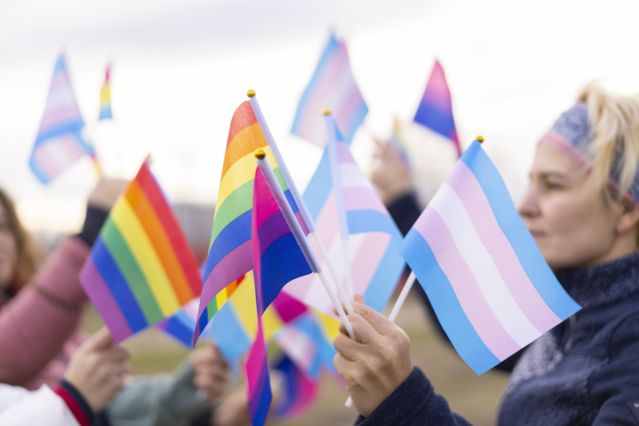Trauma
Queer or Questioning? This One Is for You
Some tips for surviving within and outside of the closet.
Posted April 22, 2024 Reviewed by Michelle Quirk
Key points
- Nearly 25% of Gen Z adults identify as queer, in comparison to 15% of millennials and only 7% of Gen X.
- When we feel othered, that can create a sense of dissociation and internal collapse.
- It is not a therapist’s job to decide whether you need to come out as queer—that decision is yours alone.

On August 5, 2022, my essay, "Please God, Help Me Stop Missing Her," was published in the New York Times Modern Love column. I had been fighting and hiding myself for decades, during which I married and divorced two separate men before finally, finally coming out of the closet as gay. But that was just in my personal life. On the outside, at my psychotherapy office bordering Central Park, I was just another basic blonde with a Ph.D. and a strong affinity for treating those who felt most misunderstood. I kept my queerness off my website, away from my public persona as a lecturer, invisible in my uniform of blazer and heels.
When my Times essay went live in the wee a.m. hours on a Friday, I was already awake. I had been lying awake all week, my heart racing. It was the first time I would be publicly, irrevocably announcing my queerness to an audience I couldn’t see, whose reactions I couldn’t control for. I was terrified.
Within hours, my inbox and social media DMs filled, with people saying they could relate, that they too were in the closet, or had sacrificed relationships with family and community to live authentically, or had a high school girlfriend they were trying to forget in an effort to live a heteronormative life. Some slipped me photos of themselves and partners they were afraid to embrace in public, out in this world that we have not yet made safe for all.
These words are for all the brave souls who have reached out to me to share their stories, and for anyone who has ever felt the pain of hiding themselves. Here is what I wish someone had told me way back when I needed to hear it.
On feeling lost:
When we feel othered, different, like there is no space for us in our families and communities, that can create a sense of internal collapse, as our brains struggle to cope with the dissonance between parts of self. Existing along the LGBTQIA+ spectrum is not a symptom of trauma. However, the homophobia, transphobia, and prejudice around us can cause us to experience trauma.
We may begin to live a “double life” of sorts, where our queerness exists in private or in anonymous online spaces. We may begin to disconnect, or dissociate, from parts of ourselves. We may feel like our memories are fuzzy, like it is impossible to tune into our pasts. We may also have a difficult time envisioning the future. Neuroscientists have found that these are all ways that our psyches react to trauma (Eisenberg et al., 2023).
If you are feeling lost and alone and out of touch with yourself, it just means that you are normal. It is normal to shut parts of yourself down in a world that does not feel like it will welcome all of you. Sometimes, it is even necessary to shut down in order to survive (van der Kolk, 2015), in order to build the strength with which to find safe spaces for yourself.
On hopelessness:
Those of us who have had to make the scariest decision of our lives—coming out of the closet versus living within its darkness—may wonder if just removing ourselves from the equation is the only way to solve it. That is understandable. For so many reasons. The first step to dealing with the darkness is knowing that it is not our fault; it is not an indication that there is something wrong with us. Rather, it is our psyche’s attempt to protect us from realities that seem insurmountable.
“When I was younger and I was struggling with my queerness so much, my solution if it all got to [be] much to me, was gonna be [suicide]… What’s crazy now, as an adult, I feel like I created this intense pathway in my brain between stress and [suicide] as a solution,” says Shannon Beveridge, a queer content creator with a following of more than 1.9 million across platforms.
If you can relate, you are not alone. Know that even if you can’t feel it right now, there is a community of people who stand shoulder-to-shoulder with you in solidarity. So many of us have been there, and we are all rooting for you.
On fear:
In 2023 alone, more than 500 anti-LGBTQIA+ bills were introduced in U.S. state legislatures, which is three times the amount of such bills in 2022. Many targeted medical care for gender-nonconforming individuals, and way too many were about restricting access to bathrooms. This is frightening for queer individuals and for youth who are trying to figure out their own identities.
An Elle magazine study found that when LGBTQIA+ content was posted to Elle social media pages, 86 percent of comments were negative, labeling queer individuals as mentally ill or intellectually challenged, or just openly cursing queer people for existing (Hayman, 2024). These numbers match what I have experienced on my own social media pages; every time I post about queer issues, I end up deleting hundreds of hate comments. It is jarring to me, as a full-grown adult with a support system and access to therapy. I cannot even imagine what it must be like to be young, alone, and in flux, receiving such hate.
If you are afraid of coming out or being out, you are not being paranoid. You are probably someone who is sensitive to vibes and to the emotional responses of others. Remember that you are the only one who knows when and how it is safe for you to be out as queer. Trust yourself and your intuition.
On that note, here are some thoughts on therapy:
It can be so helpful to have support. Especially if you are starting to feel like there is no way through, no way out.
As NYC-based psychotherapist, Amanda Anger, says, “Beveridge is of the most privileged among us. She is white, cis-gender, attractive, of middle-class background, and adored by her followers. If she is struggling, can we even imagine what queer folks without those privileges may experience on a daily basis?” Anger is one of the many queer-identified therapists who makes it a point to disclose her queerness on her professional profiles, to signal that she can provide a safe space for LGBTQIA+ clients.
Here are some green flags in a therapist: They should be able to listen without judging; should be able to hear all your thoughts, fears, and doubts; and should never, ever have an agenda of their own. It is not your therapist’s job to decide whether you need to come out as queer or whether you should keep parts of yourself private—that decision is yours alone, and no one can or should make that for you. If you feel your therapist is pushing you in one direction or another, that is a good reason to talk about it with them or to find someone else.
Look for therapists who are open about their allyship with LGBTQIA+ folks or therapists who self-identify as queer. Rainbow flags on websites, the use of pronouns, and inclusive language are all signals that therapists put out for a reason—they want you to feel safe. There are whole websites and communities of therapists who can understand you and support you. The Trevor Foundation, Jewish Queer Youth, Callen Lorde, The Loft Community Center, and so many others have open phone lines— you are allowed to use them even if you are not in crisis. They are there for you.
In closing:
It does get better, in real, measurable ways over time. On a scientific level, our minds have neuroplasticity, the ability to stretch and grow over time, in ways that allow room for finding solutions and, most importantly, for feeling hope.
It has been less than 10 years since the Supreme Court of the United States has made gay marriage legal across our country, and less than 5 since it has become illegal for U.S. workplaces to discriminate against LGBT employees. Every year, more celebrities, sports players, and visible influencers come out as queer and increase visibility for all of us. Nearly 25 percent of Gen Z adults identify as queer, in comparison to 15 percent of millennials and only 7 percent of Gen X (PRRI, 2024), numbers that show how much safer people are feeling, how much more empowered. It may not always feel like it, but the needle is moving.
Always remember, you are not the problem. Your sexual or gender identity is not the problem. It is part of what makes you so iridescent, so beautiful. One day, it can even become the thing about yourself that you love the most.
If you or someone you love is contemplating suicide, seek help immediately. For help 24/7, dial 988 for the 988 Suicide & Crisis Lifeline, or reach out to the Crisis Text Line by texting TALK to 741741. To find a therapist near you, visit the Psychology Today Therapy Directory.
Resources:
Trevor Project call 24/7: 866-488-7386
Trans Lifeline call 24/7: 877-565-8860
The Loft: https://www.loftgaycenter.org helpline: (914) 948-2932 ext. 13
Callen-Lorde: https://callen-lorde.org crisis text line: Text callenlorde to 741741
Jewish Queer Youth: jqyouth.org warmline (for a response within 24 hours): 551-JQY-HOPE (551-579-4673)
References
Beveridge, S. [@nowthisisliving]. (2024, January 8). is this too personal? [Video]. TikTok. https://www.tiktok.com/t/ZPRTQjuhw/
Eisenberg, M. L., Rodebaugh, T. L., Flores, S., & Zacks, J. M. (2023). Impaired prediction of ongoing events in posttraumatic stress disorder. Neuropsychologia, Volume 188.
Hayman, K. (2024). A Discourse of Hate: A Content Analysis of Responses to Queer Representation in Online Social Media. Canadian Journal of Family and Youth/Le Journal Canadien de Famille et de la Jeunesse, 16(1), 109–116.
New survey shows broad support for LGBTQ rights nationally, despite overall declines in the past year. PRRI. (2024, March 12).
van der Kolk, B. A. (2015). The Body Keeps the Score: Brain, Mind, and Body in the Healing of Trauma. Penguin Books.




